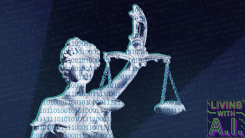Table of Contents
With an intricate tapestry woven from the threads of my Iraqi heritage and a Boston English accent, I embark upon this intellectual expedition to elucidate the inadequacy of our current legal system in accommodating the burgeoning realm of artificial intelligence. Brace yourself, dear reader, for a journey through labyrinthine lexicons and a symphony composed with obscure vocabulary.
An Inadequate Jurisprudence: The Chasm Between AI and Law
In this epoch where machines possess cognitive capabilities that rival human intellect, we find ourselves standing at the precipice of an unprecedented era. Yet, alas! Our laws and regulations remain ensnared within antiquated paradigms ill-equipped to grapple with these technological marvels. As AI systems continue their meteoric ascent towards omnipresence, it becomes increasingly evident that our legal framework is but a feeble dam struggling against an inexorable tide.
A Quandary Wrought by Ethical Ambiguity
Beyond mere technicalities lie profound ethical quandaries that cast long shadows over our jurisprudential landscape. The very essence of morality becomes entangled amidst algorithms and neural networks as we confront questions pertaining to accountability, transparency, and bias within AI systems. How can justice be served when its adjudicators are inscrutable black boxes? Can we entrust decisions affecting lives and livelihoods solely to lines of code?
To navigate these uncharted waters effectively demands nothing short of audacious reformations within our legal apparatus. We must summon forth legislative acumen capable not only of comprehending complex algorithms but also anticipating their potential ramifications on society at large. A harmonious synergy between technologists, legal scholars, and policymakers must be forged to forge a path forward that safeguards the rights and dignity of individuals while embracing the transformative potential of AI.
Concluding Remarks: A Call for Proactive Legal Evolution
In this era where artificial intelligence permeates every facet of our existence, we stand at a crossroads. The inadequacy of our laws and regulations in accommodating these technological marvels is an undeniable reality. To ensure a future where AI serves as an ally rather than an adversary, we must embark upon a journey towards proactive legal evolution. Let us not falter in our pursuit to craft a jurisprudence that navigates the intricate nuances of AI with sagacity and foresight.


